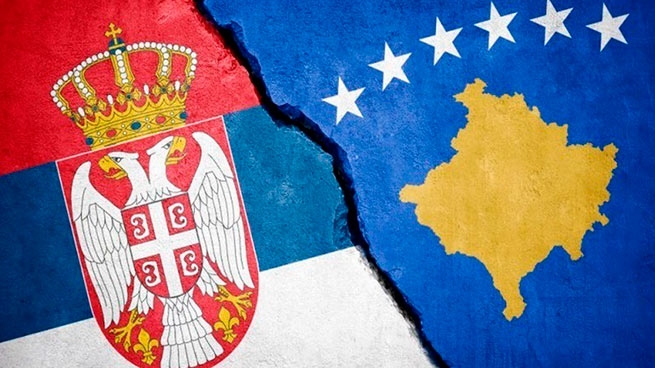The European Union published an agreement on the normalization of relations between Serbia and Kosovo, which was accepted by both parties.
Serbian President Aleksandar Vučić and Kosovo’s Prime Minister Albin Kurti met yesterday, Monday, with the Union’s High Representative for Foreign Policy, Josef Borel, and Special Envoy for Kosovo, Miroslav Lajcak, agreed to the implementation of the agreement.
The Albanian Post published its insider. According to Albanian journalists, negotiations on the Franco-German proposal for Kosovo are over. Now the formula is “take it or leave it.”
That is, each of the parties to the conflict has only two options: to accept the agreement in the form in which it was drawn up by the European mediators, or to refuse. And in this case, they will face inevitable punishment. They also write about some “personal sanctions against Vucic and Kurti.
Below is the full text of the Agreement on the Normalization of Relations between Serbia and Kosovo, published on the official website EU.
The Parties, realizing their responsibility for maintaining peace, are determined to promote fruitful regional cooperation and security in Europe and overcome the legacy of the past, realizing that the inviolability of borders and respect for territorial integrity and sovereignty, and the protection of national minorities are the basic conditions for peace, guided by historical reality and not questioning the different views of Parties on fundamental issues.
Article 1
The parties (ie Serbia-Kosovo) will develop mutual normal good neighborly relations on the basis of equality. Both parties mutually recognize documents and state symbols, including passports, diplomas, vehicle registration plates and customs stamps.
Article 2
Both parties will be guided by the purpose and principles set forth in the Charter of the United Nations, in particular those relating to the sovereign rights of States, respect for their independence, autonomy and territorial integrity, the right to self-determination and the protection of human rights, and non-discrimination.
Article 3
In accordance with the Charter of the United Nations, the Parties will settle all disputes between them only by peaceful means and refrain from the threat or use of force.
Article 4
The parties agree that neither of them can represent the other in the international sphere or act on her behalf. Serbia will not oppose Kosovo’s membership in any international organization.
Article 5
Neither side will hinder or encourage others to hinder the progress of the other side on its path towards the European Union. Both parties will respect the values mentioned in Articles 2 and 21 of the Treaty on European Union.
Article 6
While this agreement represents an important step towards the normalization of relations, both sides will continue the EU-facilitated dialogue process with new momentum, which should lead to a legally binding agreement on the general normalization of their relations.
The Parties agree that in the future they will deepen cooperation in the field of economics, science and technology, transport and communications, judicial relations and law enforcement in the field of telecommunications, health, culture, religion, sports, environmental protection, missing and displaced persons, as well as in other areas, by reaching specific agreements. Details will be agreed in supplementary agreements through a dialogue facilitated by the EU.
Article 7
Both parties are in favor of reaching concrete agreements, in accordance with the relevant mechanisms of the Council of Europe and drawing on existing European experience, to ensure an appropriate level of self-government of the Serb community in Kosovo and the possibility of providing services in some specific areas, including the possibility of obtaining financial assistance from Serbia and the establishment of direct channels of communication between the Serbian community and the government in Kosovo.
The Parties shall ratify the official status of the Serbian Orthodox Church in Kosovo and ensure a high level of protection for Serbian religious and cultural heritage in accordance with existing European standards.
Article 8
The parties will exchange permanent diplomatic missions. Their headquarters will be located where the seat of the local government is located. Practical issues related to the location of representative offices will be considered separately.
Article 9
Both sides take note of the commitment of the EU and other donors to create a special financial assistance package for joint projects of the two sides in economic development, communications, transition to green energy and other key sectors.
Article 10
The Parties will set up a joint committee chaired by the EU to monitor the implementation of this agreement. Both sides reaffirm their commitment to the implementation of all previous agreements.
Article 11
Both parties undertake to abide by the implementation roadmap attached to this agreement.
Journalists caught Aleksandar Vučić on the way out after meeting with the “prime minister” of Kosovo and European mediators, the TG channel balkanossiper reports. The negotiations were so difficult that even Josep Borrell clutched his head. According to preliminary information, Belgrade recognizes the passports and diplomas of the self-proclaimed republic, but an agreement on normalization within the framework of the Franco-German plan was not reached today.
The correspondent of the Albanian edition decided to ask Vučić head-on: does Serbia recognize the independence of Kosovo? Alexander Vučić hastened to remind him that Serbia, unlike the self-proclaimed republic, is a member of the UN, always respects its charter and other norms of international law, and does not forget about its own constitution.







More Stories
The 33rd Olympic Games opened in Paris (updated)
FT: "consumer boom in Russia"
Massive attack on French rail network on opening day of Olympics